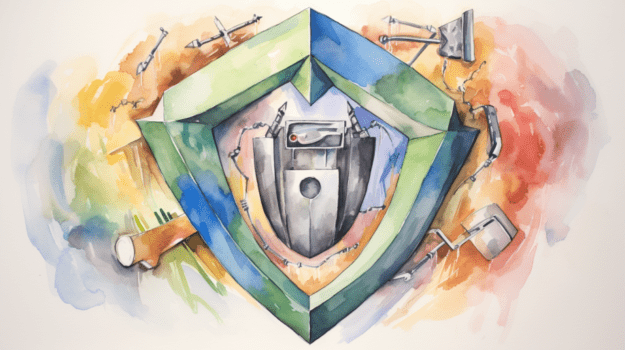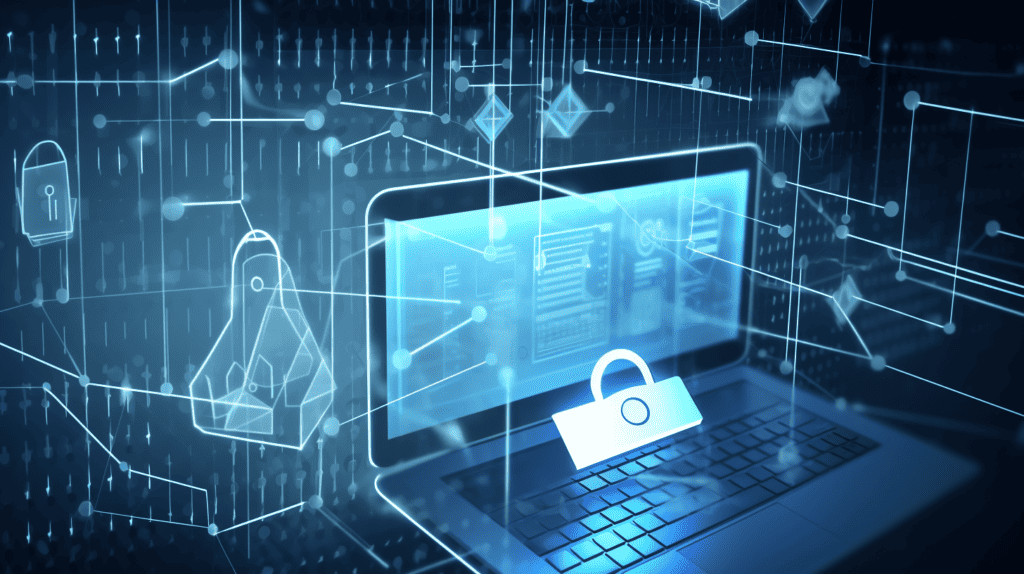Last Updated on July 28, 2023 by Said Al Azri
Introduction

The importance of information security in the digital age
In today’s rapidly evolving digital landscape, information security has become paramount. With the proliferation of cyber threats, safeguarding sensitive data has become a critical concern for individuals and organizations alike.
The role of tech startups in driving innovation in the field
In this era of increased connectivity and advanced hacking techniques, traditional security measures often fall short in providing adequate protection. It is within this context that tech startups have come to the forefront, wielding their expertise to disrupt the information security industry and spearhead groundbreaking innovations.
Rising Threats in Information Security

The increasing risks and challenges faced by individuals and organizations
The escalating threats in information security pose significant challenges for both individuals and organizations. Hackers and cybercriminals have honed their skills, using sophisticated techniques to bypass security measures.
Examples of high-profile cybersecurity breaches
High-profile cybersecurity breaches, such as the Equifax data breach and the WannaCry ransomware attack, have highlighted the vulnerabilities in existing systems. These incidents have demonstrated the pressing need for revolutionary solutions that can effectively combat the ever-evolving threat landscape.
The Need for Revolutionary Solutions

Why traditional security measures fall short?
Traditional security measures, while valuable, often fail to keep pace with the rapidly evolving threat landscape. Hackers constantly adapt their techniques, rendering many legacy systems ineffective.
The limitations of legacy systems and approaches
Conventional approaches often lack the agility required to respond swiftly to emerging threats. Additionally, they struggle to provide comprehensive protection against both known and unknown vulnerabilities. To combat these shortcomings, the industry requires revolutionary solutions that redefine the approach to information security and address the limitations imposed by traditional systems.
The Rise of Tech Startups in Information Security

The emergence of startups as disruptors in the industry
Tech startups have emerged as major disruptors in the information security industry. These innovative companies bring fresh perspectives and novel approaches to the table. Unlike established giants, startups are unencumbered by legacy systems, allowing them to pivot quickly and adapt to new threats.
The advantages startups bring to the table
Through their agility and focus on research and development, startups have been able to develop cutting-edge technologies that are revolutionizing information security. They bring the passion and drive required to push boundaries and usher in the next generation of cybersecurity solutions.
Artificial Intelligence and Machine Learning Safeguards

The application of AI and ML in securing networks and systems
Artificial Intelligence (AI) and Machine Learning (ML) have emerged as powerful tools in the battle against cyber threats. Startups are leveraging these technologies to develop sophisticated safeguards for networks and systems.
How startups leverage these technologies for advanced threat detection and prevention?
Through AI and ML algorithms, these startups can detect anomalies and patterns indicative of malicious activities. By analyzing massive amounts of data, these systems can proactively identify and prevent cyber attacks, significantly augmenting the overall security posture of individuals and organizations.
Blockchain Solutions for Secure Data Management

Startups leveraging blockchain technology to enhance information security
Blockchain technology, with its inherent transparency and immutability, offers promising solutions for secure data management. Startups in the information security domain are harnessing the power of blockchain to enhance the integrity and confidentiality of digital assets.
The potential of decentralized systems for secure data management
By implementing decentralized systems, these startups address the vulnerabilities of centralized storage and provide robust protection against unauthorized access and data tampering. With blockchain at the helm, secure data management reaches new heights of assurance and trust.
Encryption Innovations and Secure Communication

Startups focused on developing cutting-edge encryption methods
Startups specializing in encryption methodologies are at the forefront of developing cutting-edge encryption algorithms. These innovative companies are designing advanced encryption techniques that not only ensure confidentiality but also maintain the integrity and authenticity of data.
Advancements in secure communication tools for individuals and businesses
Alongside encryption, startups are also revolutionizing secure communication tools for individuals and businesses. These tools go beyond traditional encryption methods, employing state-of-the-art cryptographic protocols and secure messaging platforms to fortify communication channels against interception and unauthorized access.
Zero Trust Security Frameworks

The concept of zero trust security and its benefits
Zero Trust Security, an emerging paradigm in information security, emphasizes the abandonment of traditional perimeter-based security models. Startups exploring this approach advocate for continuous authentication and authorization throughout the entire network, establishing a zero-trust stance towards user access.
Startups offering innovative solutions based on this framework
By rigorously validating user identities and permissions at all levels, these startups minimize the potential attack surface and significantly enhance security. Through innovative solutions based on the Zero Trust framework, startups revolutionize how organizations safeguard their digital assets.
Biometric and Behavioral Authentication

Startups utilizing biometric and behavioral authentication methods
Startups are leveraging biometric and behavioral authentication methods to bolster the accuracy and security of identity verification. By employing unique physiological and behavioral characteristics, such as fingerprints, iris scans, and keystroke dynamics, these startups offer highly secure authentication solutions.
The advantages and challenges of these innovative approaches
Biometric and behavioral authentication provides greater assurance of an individual’s identity, making it harder for malicious actors to impersonate legitimate users. While these innovative approaches offer significant advantages, challenges such as privacy concerns and potential vulnerabilities also need to be addressed.
Cloud Security and Data Protection

Startups addressing the unique security concerns within cloud environments
As organizations increasingly rely on cloud services, startups have stepped up to address the unique security challenges posed by cloud environments. These startups develop robust cloud security solutions that protect sensitive data from unauthorized access, data breaches, and insider threats.
Advancements in securing data stored and processed in the cloud
Additionally, innovative encryption techniques and advanced access controls ensure the confidentiality and integrity of data stored and processed in the cloud. Through their revolutionary technologies, startups are paving the way for secure cloud adoption in the digital era.
IoT Security Solutions

The risks associated with the Internet of Things (IoT)
The explosive growth of the Internet of Things (IoT) has introduced a myriad of security risks. Startups are actively developing innovative solutions to protect IoT devices and networks from potential breaches.
Startups developing innovative approaches to protect IoT devices and networks
By implementing robust security protocols and encryption mechanisms, these startups safeguard sensitive data transmitted between IoT devices and prevent unauthorized access. In an age where IoT integration is becoming increasingly prevalent, these startups play a vital role in ensuring the security and resilience of IoT ecosystems.
Threat Intelligence and Cybersecurity Analytics

Startups offering intelligent threat analysis and predictive analytics solutions
Startups specializing in threat intelligence and cybersecurity analytics are arming organizations with powerful tools to proactively defend against cyber threats. Using advanced algorithms and machine learning techniques, these startups analyze vast amounts of data to detect patterns and identify potential threats before they materialize.
How these innovations enable proactive defense against cyber threats?
By leveraging real-time threat intelligence and predictive analytics, organizations gain invaluable insights into emerging threats, enabling them to take proactive measures and fortify their defenses effectively.
Vulnerability Management and Patching Solutions

Startups dedicated to efficient vulnerability management and patching
Startups focused on vulnerability management and patching offer innovative solutions to identify and remediate vulnerabilities in software and systems promptly. Through sophisticated vulnerability scanning techniques, these startups efficiently detect weaknesses before they are exploited by malicious actors.
The importance of timely and automated patching processes
Moreover, through automated patching processes, they ensure the timely deployment of security patches, reducing the window of opportunity for potential attacks. By adopting these solutions, organizations can significantly enhance their resilience against ever-evolving threats.
Security Awareness Training and Employee Education

Startups focusing on educating users and organizations about information security best practices
Startups specializing in security awareness training and employee education play a pivotal role in strengthening the human element of cybersecurity. By providing comprehensive training programs, these startups equip users and organizations with the necessary knowledge and skills to identify and mitigate security risks.
The role of comprehensive cybersecurity training in preventing cyber incidents
From phishing simulations to interactive modules, these startups empower individuals to become the first line of defense against cyber threats. Through their efforts, these startups contribute to building a cybersecurity-conscious culture that minimizes the likelihood of successful cyber attacks.
Compliance and Regulatory Solutions

Startups providing solutions to address compliance and regulatory challenges
Compliance with industry standards and regulations is a critical aspect of ensuring information security. Startups are addressing the challenges associated with compliance by developing innovative solutions that simplify the process of adhering to regulatory requirements.
The importance of aligning security practices with industry standards and regulations
These startups offer automated systems that help organizations track, monitor, and enforce compliance. By aligning security practices with industry standards, organizations can demonstrate their commitment to protecting sensitive information and mitigate the risks associated with regulatory non-compliance.
Adaptive and Self-Defending Networks

Startups working on adaptive and self-defending network infrastructure
Startups specializing in adaptive and self-defending network infrastructure are reshaping the security landscape. By utilizing advanced machine learning algorithms and real-time threat analysis, these startups develop networks capable of autonomously adapting to changing threats.
How these systems limit the impact of attacks and enable quick recovery?
These networks continuously monitor and analyze traffic, identifying potentially malicious activities and effectively mitigating them in real-time. By limiting the impact of attacks and enabling quick recovery, startups focusing on adaptive and self-defending networks bolster the overall security posture of organizations.
Incident Response and Recovery Innovations

Startups aiming to improve incident response and recovery times
Startups dedicated to incident response and recovery play a crucial role in minimizing the impact of cyber-attacks. These innovative companies develop automated incident management and recovery tools that streamline the response process, reducing downtime and financial losses.
Advancements in automated incident management and recovery tools
By automating incident detection, containment, and remediation, these startups enable organizations to respond swiftly and efficiently to cyber incidents. Through their innovations, startups enhance the overall resilience of organizations against existing and emerging threats.
Cyber Insurance and Risk Assessments

Startups offering innovative cyber insurance solutions and risk assessment tools
In an era where cyber threats continue to evolve and grow in potency, the importance of cyber insurance cannot be overstated. Startups specializing in cyber insurance provide innovative solutions that help organizations mitigate financial risks associated with cyber incidents.
The importance of cyber insurance in today’s threat landscape
These startups offer customized policies that cover a wide range of potential damages, including data breaches, business interruption, and reputational harm. By conducting comprehensive risk assessments, they enable organizations to identify vulnerabilities and take proactive measures to strengthen their security posture.
Future Trends in Information Security Startups

Analyzing emerging trends that will shape the future of information security startups
The future of information security startups holds immense potential for groundbreaking innovations. Emerging trends such as quantum-resistant cryptography, deep learning-based threat analysis, and threat intelligence sharing platforms are poised to shape the industry significantly.
Speculating on potential revolutionary innovations yet to come
Startups will continue to push the boundaries of technology and explore uncharted territories to ensure the utmost security and resilience. With the rapid advancement of technology, the possibilities seem limitless, and the coming years are likely to witness the emergence of revolutionary solutions that redefine information security standards.
Summary and Conclusion

The significant breakthroughs in information security driven by startups
Tech startups have emerged as catalytic forces in revolutionizing information security. Their relentless pursuit of groundbreaking innovations has brought about significant breakthroughs in various areas of cybersecurity.
The crucial role of these innovations in safeguarding digital assets
From leveraging artificial intelligence and blockchain technology to developing secure communication tools and adaptive network infrastructure, startups have been at the forefront of safeguarding digital assets. As their influence continues to grow, these startups contribute to the constant evolution of information security practices, ensuring a safer and more secure digital future for individuals and organizations alike.
FAQ (Frequently Asked Questions)

What are the main challenges addressed by information security startups?
Information security startups tackle a broad array of cybersecurity challenges. They often focus on preventing data breaches, mitigating the risk of malware attacks, ensuring compliance with privacy laws and regulations, and strengthening network security. They also aim to develop solutions that can quickly detect, respond to, and recover from security incidents.
How do tech startups utilize artificial intelligence in information security?
Tech startups are using AI to revolutionize information security. AI algorithms can process vast amounts of data to identify potential threats or anomalies that a human might miss. Machine learning can help create systems that ‘learn’ to distinguish between normal and suspicious behavior, improving the accuracy of threat detection over time. For instance, Darktrace uses AI to detect unusual behavior in real time, allowing for quicker responses to potential threats.
What makes blockchain technology an attractive solution for secure data management?
Blockchain’s attractiveness lies in its decentralization and immutable nature. Each block in the chain contains a list of transactions, which, once verified, cannot be altered or deleted. This makes it difficult for unauthorized parties to tamper with the data, thereby ensuring data integrity. Companies like Chain of Things are utilizing blockchain to secure IoT data, for instance.
How do zero trust security frameworks differ from traditional security models?
Traditional security models often operate on the assumption that activities within the network are trustworthy. In contrast, zero trust models work on the principle of “never trust, always verify.” This means that every user and device must be authenticated and authorized, whether they are inside or outside the network perimeter. This can greatly minimize the risk of internal threats, which traditional models may overlook.
What are the benefits and limitations of biometric and behavioral authentication methods?
Biometric and behavioral authentication methods like fingerprint recognition or keystroke dynamics provide an added layer of security by using unique physical or behavioral characteristics. They are hard to fake and easy for the user, enhancing security while improving user experience. However, they can also pose privacy concerns, and in the case of biometrics, there’s the risk that if compromised, you can’t change your fingerprints or retinal pattern like you can a password.
How do startups enhance security in cloud environments?
Startups are enhancing cloud security through encryption, identity and access management, and regular security audits. Some startups offer Cloud Access Security Broker (CASB) solutions that provide visibility into cloud application use, data protection, and threat protection. A good example is Netskope, a cloud security startup that helps organizations understand risky activities, protect sensitive data, and ensure compliance in real-time across the cloud environment.
What role does multi-factor authentication play in information security?
Multi-factor authentication (MFA) adds an additional layer of security by requiring users to provide two or more verification factors to gain access to a resource. This means that even if a cybercriminal gets hold of a user’s password, they still can’t access the account without the other factors. Startups like Duo Security offer MFA solutions to reduce the risk of unauthorized access.
How are startups helping with security in the era of remote work?
As remote work grows, so does the security risk. Startups are addressing this with solutions for secure remote access, such as Virtual Private Networks (VPNs), end-to-end encryption, and secure cloud collaboration tools. Additionally, startups are providing security awareness training specifically tailored to the risks associated with remote work.
How does machine learning contribute to threat hunting?
Machine learning helps automate the threat hunting process. By analyzing patterns and behaviors in network data, machine learning can help identify anomalies that may signify a security threat. Over time, the algorithms can ‘learn’ and improve their detection capabilities, allowing for proactive threat hunting. Startups like Vectra AI are using machine learning for real-time threat detection and hunting.
What role do startups play in privacy protection?
Startups are increasingly involved in creating solutions to protect user privacy. This includes tools for anonymizing data, managing consent, and ensuring compliance with privacy regulations like the GDPR. They also help businesses manage and protect personal data across various platforms and services, thereby enhancing trust with their customers.
What are the risks associated with IoT devices, and how do startups address them?
IoT devices can pose security risks due to inadequate security features and the potential for unauthorized access. This can lead to data breaches or even physical security threats. Startups are addressing these risks by developing security solutions specifically for IoT. For example, Armis offers an agentless IoT security platform that lets enterprises see and control any device or network.
How can threat intelligence and cybersecurity analytics improve defense against cyber threats?
Threat intelligence and cybersecurity analytics can help organizations anticipate, prevent, and respond to cyber threats. By collecting and analyzing data on potential threats, companies can better understand their risk landscape and strengthen their defenses accordingly. Companies like Recorded Future offer real-time threat intelligence to help organizations proactively defend against cyberattacks.
What are the key advantages of automated patching solutions?
Automated patching solutions streamline the process of updating software with the latest security patches. They reduce the risk of human error and ensure timely updates, minimizing the window of opportunity for hackers to exploit vulnerabilities. Companies like Automox offer cloud-native cyber hygiene solutions to automate the patching process.
Why is security awareness training crucial for preventing cyber incidents?
Security awareness training educates employees about cybersecurity best practices and the latest threats. This is crucial because human error often contributes to cyber incidents. Startups like KnowBe4 provide interactive training modules to help employees recognize and respond appropriately to potential cyber threats.
How do startups assist organizations in complying with industry standards and regulations?
Startups offer compliance solutions to help businesses navigate complex regulations. This can include everything from automated compliance checks to data management tools that help maintain privacy standards. A good example is TrustArc, which provides solutions for managing digital privacy compliance.
What are the features of adaptive and self-defending networks?
Adaptive and self-defending networks have the ability to detect potential threats and automatically take defensive actions. This could involve isolating affected network segments or blocking malicious traffic. Companies like Illumio offer adaptive security solutions that can adjust to changes in the network and ongoing threats.
How can startups improve incident response and recovery times?
Startups are leveraging technologies like AI to expedite incident response and recovery. They provide tools that can quickly identify, isolate, and mitigate threats, reducing the impact of security incidents. Startups like Rapid7 offer incident detection and response services that integrate with existing infrastructure and automate tasks for faster recovery.
How does cyber insurance mitigate risks in information security?
Cyber insurance helps mitigate financial risks associated with data breaches and other cyber incidents. While it doesn’t prevent attacks, it can cover costs related to incident response, data recovery, and even legal fees. Startups like Coalition provide comprehensive cyber insurance alongside security tools to help prevent and respond to threats.
What future trends can we expect in information security startups?
We can expect to see information security startups continue to innovate in areas like AI and machine learning for threat detection and response. There will also likely be a focus on privacy protection, given the increasing regulatory focus on data privacy. Furthermore, with the shift to remote work, startups that provide security solutions for distributed teams and cloud environments will be in high demand.






